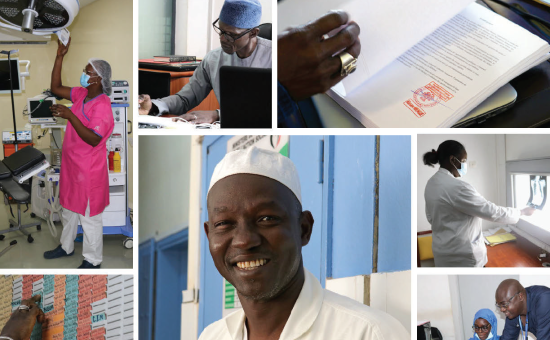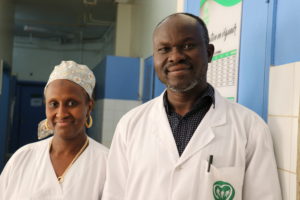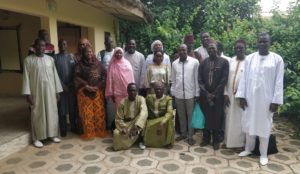
03 Sep Celebrating HRH2030 Senegal: Key Achievements in Strengthening Human Resources for Health
The Human Resources for Health in 2030 (HRH2030) Senegal program, funded by USAID Senegal from June 2016 to June 2021, provided technical assistance directly to the Senegal’s Ministry of Health and Social Action to improve recruitment, distribution, retention, and motivation of the health workforce. The program was implemented by Chemonics International, with contributions from HRH2030 program partners Palladium, Amref, and Open Development; all worked together to support Senegal in achieving its health workforce goals. HRH2030 published the program’s final report in September 2021. This article highlights the key achievements stated in the report.
Acknowledging the critical role that health workers play in delivering high quality care to the Senegalese people, and with USAID’s support, Senegal’s Ministry of Health and Social Action (MSAS) has prioritized investments in supporting the development of human resources for health (HRH). As the first-ever direct HRH development support program to the MSAS, HRH2030 was anchored in the ministry’s Human Resources Directorate and collaborated with all central-level health departments, hospitals, regional health offices, and civil society organizations in strengthening the management of HRH. Collaborating with MSAS directors and executives at all levels of the health system, HRH2030 increased the use of HRH data for more effective human resources planning and management; empowered stakeholders to adopt policies that improved the motivation and equitable distribution of health personnel; strengthened leadership for effective governance of health workers; and improved preparedness and responsiveness to infectious disease threats like Ebola and the COVID-19 pandemic.
HRH2030 Senegal’s key achievements include:
The MSAS has a fully functional human resources information system (iHRIS) being used for decision-making at all levels of the health system. When HRH2030 began supporting the Human Resources Directorate (DRH), the state of health workforce data was bleak. The national human resource information system was not fully functional, lacked current data, and was not being used regularly or effectively at the central or regional levels. With HRH2030’s support, the DRH is now managing a functional, integrated human resources information system that provides decision-makers with quantitative and qualitative data on health workers in real time. Demonstrating a commitment at the highest level to ensure continued accurate, timely data on the health workforce, in April 2021, the Ministry issued an official decree mandating that health workers enroll in iHRIS to receive their quarterly incentive payments. With this step, the iHRIS has been cemented as an integral component of decision making in the country—from leaders at the top to health workers on the frontlines of service delivery.
Health system clients are benefitting from increased accessibility and availability of services, as a result of data-driven health workforce deployment. The institutionalized iHRIS and new culture of data use is having a direct impact on the facility level. Data is making a difference at all points of service delivery, from big hospitals to rural health centers. Human resource focal points are relying on data to inform staffing, fill health worker gaps, and relieve overburdened staff. For example, in the rural district of Keur Massar, the referral health center is no longer referring clients in need of surgery to hospitals in Dakar, since it now has a fully staffed operating room.

Photo: Health workers in Grand Yoff General Hospital, Senegal.
Management of health workforce deployment, distribution and transfers is being guided by new policies and guidelines. One of HRH2030’s key program objectives was to support the targeted review, creation, and implementation of policies and guidelines for an equitable, sustainable distribution of HRH. HRH2030 assisted the Human Resources Directorate to professionalize and institutionalize its management capacities, by developing tools and resources to support a more equitably distributed workforce. For the first time, the directorate has a standard operations and procedures manual for the central-level operations, developed with the support of HRH2030. This new manual is consulted regularly as a key reference document by the current staff and to orient newly hired staff. In total, there were 23 policies, guidelines, and strategies that HRH2030 helped to develop and implement, all of which are supporting the MSAS’s goal of a more rational, equitable distribution of the health workforce.
The new National Plan for Development of Human Resources for Health 2021-2028 is in place and will guide HRH strategies over the next seven years. In the program’s early years, HRH strategies were planned to align with Senegal’s 2011-2018 National Plan for Human Resources for Health Development (PNDRHS). As Ministry leadership began envisioning the next iteration of the plan, with an overarching goal of ensuring a more equitable distribution of health workers, they turned to HRH2030 for assistance. HRH2030 began by working with the Ministry to evaluate the level of implementation of the 2011-2018 plan; the evaluation showed that implementation of planned activities ranged from 0 percent to 30 percent, primarily due to lack of financial resources, weak leadership, and little communication around the plan’s purpose and achievements.
HRH2030 then worked with the DRH to develop a draft roadmap to prepare for the new plan, outlining the specific activities, target dates for deliverables, and key contributors to ensure success. HRH2030 also worked with the DRH to set up a steering committee to oversee and monitor the development of the national plan, and to advocate for support for the plan from Senegal’s key health and development partners. The new plan, the 2021-2028 National Plan for Human Resources for Health Development, now serves as a framework for all interventions in the health and social sectors, putting in place strategies and approaches to ensure an effective and functional HR workforce with a focus on improving the recruitment, distribution, retention, and motivation of Senegal’s health workers.

Photo: Participants in a leadership and management training workshop of the regional health management teams and health district management team leaders.
The leadership, management, and organizational capacity of the MSAS has been strengthened, with the DRH now operating under a cohesive, unified vision of its role. Today, Senegal’s HR leaders and managers have changed the way they oversee the implementation of programs to achieve health outcomes that align with greater MOH objectives. Previously, ministry directorates at the central level tended to operate in isolation with limited coordination and communication, resulting in duplication of responsibilities and activities and poor use of available resources. HRH2030 supported the ministry to improve its organizational leadership capacity, and now the DRH works with a cohesive and unified vision of its role in addressing the HRH issues within the MSAS. The MSAS is moving forward with enhanced knowledge, expertise, and capacity to develop and implement human resources policies and practices that promote an accessible, available, acceptable, and high-quality health workforce, one that is being more equitably distributed to serve Senegal’s population, and one that will continue to advance progress toward universal health coverage.
Read the complete final report, available here.





